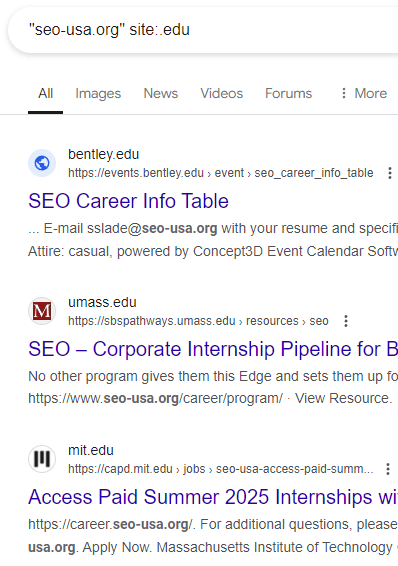People are always complaining that something is wrong with Google search results, but what’s happening in the search results for queries that contain the acronym “SEO” is in a league of its own and has to be seen to be believed.
Anomalies in search results
An anomaly is something that deviates from the norm or what is expected. When there's something wrong with a search engine results page (SERP), the anomaly can often be explained. For example, queries that combine geographic elements with relatively long phrases tend to produce odd results. Another cause of odd search results is when there isn't enough data about a particular word combination. This can lead to unpleasant search results.
What's happening with this particular group of keyword phrases related to the word “SEO” isn't this type of anomaly. It's a true anomaly.
Here are some keywords that Google is (probably) getting wrong:
- SEO Program
- What is an SEO program?
- SEO New York (City)
- SEO New York
- SEO Conference
- SEO Events
- SEO Education
- SEO Awards
- SEO-USA.Org
A site that ranks highly for all SEO search queries (and probably more) is a site called SEO-USA.org. The initials on this website, SEO, stand for Sponsors for Educational Opportunity. This is not a spam site, but a legitimate non-profit website that has been around since 1963. The purpose of this non-profit organization is to provide mentorship to underprivileged youth and help them get into college. This program has evolved into SEO Scholars, an eight-year academic program that helps talented young people get into high school and college.
“SEO Scholars creates a more equitable society by eliminating learning opportunity gaps for motivated young people and setting the standard in academics, mentorship, community, peer-to-peer support, and strong lifelong networks.”
SEO-USA.org is not about SEO
The acronym SEO is highly relevant in the context of online marketing. If you search for “SEO” on Google, you'll see all suggestions related to SEO in the sense of search marketing.
According to Google Trends, the phrases SEO Scholars and SEO Scholars Application are not widely searched for in the United States, with most searches occurring in New York. However, SEO-USA.org ranks highly for the above group of keywords outside of New York.
Screenshot of SERP for keyword phrase “SEO Awards”

It is clear that SEO-USA.org has no connection to the most commonly understood meaning of the acronym SEO.
Is it because of backlinks?
The reason SEO-USA.org ranks so highly for all of these phrases can be attributed to backlinks: if you limit your search to .edu sites, you'll see about 70 .edu websites linking to the SEO-USA.org domain name.
This is an advanced search that shows many .edu sites that link or mention SEO-USA.org.
"seo-usa.org" site:.edu"
Site screenshot: .EDU search

There are also many high quality sites on the dot org domain that link to SEO-USA.org, which you can find using the following advanced search:
"seo-usa.org" site:.org -site:seo-usa.org"
On the surface, it seems obvious that backlinks are the reason SEO-USA.org ranks for unrelated keywords.
But of course, the most obvious answer isn't always the right one — there's more to the picture.
Why links don't explain rankings
If links were the reason SEO-USA.org ranks, then just about every SEO-related keyword phrase would be scattered across .edu and .org websites, but that's not the case.
I've been doing SEO for about 25 years and I remember a time when sites with the highest PageRank levels got virtually every ranking, and dot edu links were considered powerful because they could rank pretty high in SEO.
As Google’s algorithms have improved and link context has become more important, .edu links have started to become less effective. Words in title elements and words in the surrounding text influence links. I know this from experience.
Another important change in Google’s link ranking algorithm is the weakening of the impact of link count. Previously, a large number of links would allow a site to rank higher than more authoritative sites. I know this from experience.
But the impact of large numbers of links also changed in many ways: for example, hundreds of links from one domain no longer count as hundreds of links, but as one link. The position of the link on the page also became more important, and many changes were made that weakened the power of links, making them less and less important for the wrong reasons.
I am a bit skeptical that links are the reason SEO-USA.org ranks.
What is the answer?
For some reason, the relevance factor isn’t working, which means the (probably) irrelevant SEO-USA.org site ends up ranking for keywords it probably shouldn’t rank for.
I think that's the clue, the reason why the site is ranking where it shouldn't be – it's missing something that would normally exclude it, so it's slipping through the ranks.
It's entirely possible that the site is excluded due to reliability factors. This is just a guess. Any thoughts?
Featured image: Shutterstock/SS 360


